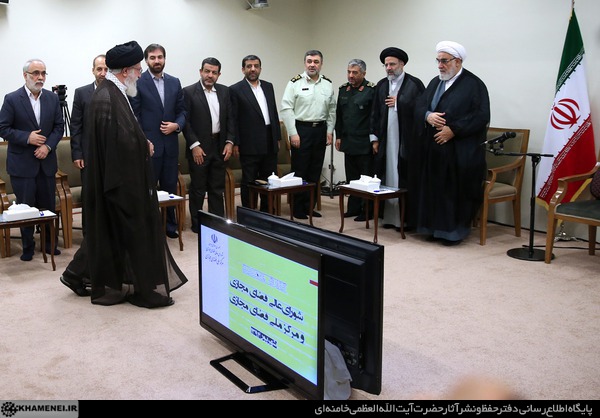Security and intelligence agencies
In addition to the Supreme Council of Cyberspace, other institutions play an important role in shaping internet policies and use in Iran—but they are similarly under the direct or indirect control of Khamenei.
The Working Group to Determine Instances of Criminal Content is the principal body charged with making internet filtering decisions. This group reports directly to the judiciary, whose head is under Khamenei’s authority. The judiciary itself also has the power to shut down websites or applications, order the deletion of content, and order filtering, as does the country’s cyber police. The cyber police are under the authority of Iran’s national police, which reports to the Ministry of Interior. While that ministry is ostensibly under Rouhani’s authority, as is the case with other ministries that are considered important to the country’s security (such as the Ministry of Intelligence, the Ministry of Islamic Culture and Guidance, and the Ministry of Education), the head of the Ministry of Interior cannot be appointed without Khamenei’s approval. Iran’s Ministry of Islamic Guidance also can limit users’ access to information.

Members of the Supreme Council of Cyberspace customarily visit the supreme leader to receive his advice on internet policies.
Yet it is direct interventions by Iran’s security and intelligence agencies, in particular Iran’s Islamic Revolutionary Guard Corps (IRGC), which also report directly to Supreme Leader Khamenei, that have come to play an increasingly important role in shaping the country’s internet policies.8
For example, Iran’s Telecommunications Company, which is owned by the IRGC, is one of the principal entities involved in the design and development of the National Information Network (NIN), Iran’s state-controlled and censored the internet, according to the NIN’s documents on the Ministry of Communication’s website. In addition, CHRI has learned from sources who attended high-level policy meetings organized to address the implementation of the NIN that security and intelligence agents from the IRGC were not only regularly present, but served as the principal decision-makers at the meetings.10
One participant in the above–mentioned meeting told CHRI, “Agents from security agencies participate in most meetings with fake first and last names …they believe there is no way to control the internet, and that therefore we have no choice but to block the network’s gateways inside and outside the country. This is the same policy pursued during the tenure of Mahmoud Ahmadinejad. Put simply, they want to launch an intranet.”
In addition, the Intelligence Organization of the IRGC assumes a lead role in targeting individuals, organizations and websites for surveillance and cyberattacks. For example, they directed and led the “Spider” operation, aimed at monitoring and bringing down social media networks that facilitated western cultural “infiltration.”

